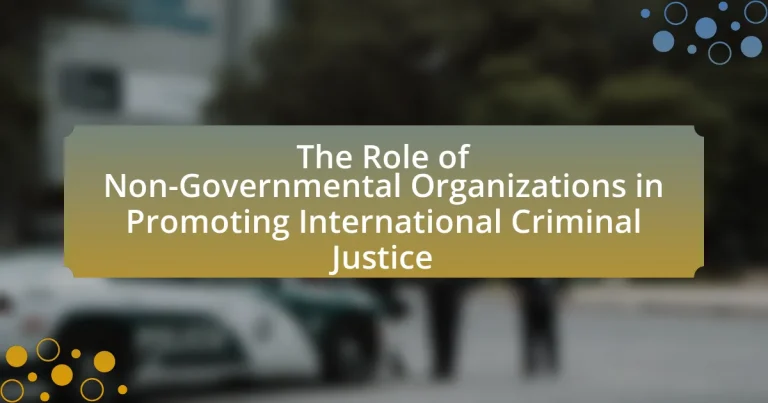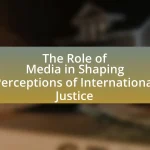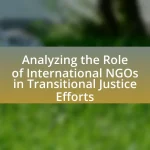Non-Governmental Organizations (NGOs) play a vital role in promoting international criminal justice by advocating for accountability, providing legal assistance, and raising awareness of human rights violations. Key organizations such as Human Rights Watch and Amnesty International monitor abuses, influence policy, and support victims in accessing justice. The article explores the specific functions of NGOs, their collaboration with international legal bodies, the challenges they face, and their impact on legal frameworks and policy changes. It also highlights notable NGOs and their initiatives, emphasizing the importance of strategic partnerships, advocacy, and technology in enhancing their effectiveness in the field of international criminal justice.
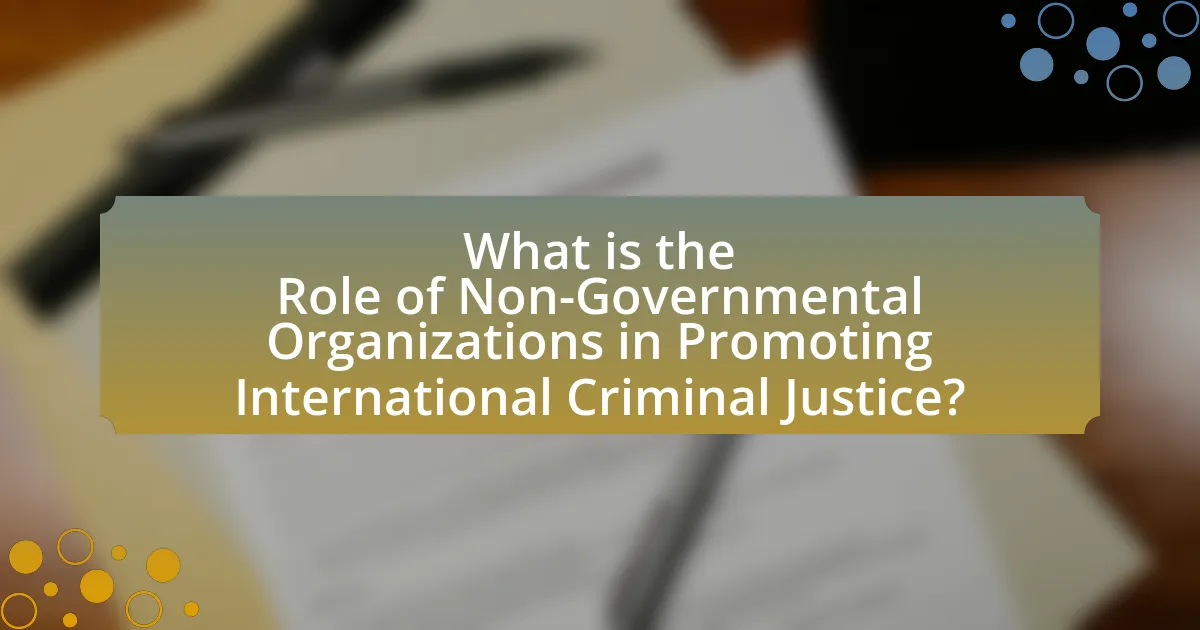
What is the Role of Non-Governmental Organizations in Promoting International Criminal Justice?
Non-Governmental Organizations (NGOs) play a crucial role in promoting international criminal justice by advocating for accountability, providing legal assistance, and raising awareness about human rights violations. NGOs such as Human Rights Watch and Amnesty International monitor and document abuses, influencing public opinion and policy decisions. They often engage in lobbying efforts to support the establishment and functioning of international tribunals, such as the International Criminal Court, thereby contributing to the enforcement of international law. Additionally, NGOs facilitate access to justice for victims by offering legal support and resources, which enhances the overall effectiveness of international criminal justice systems. Their work is supported by numerous reports and studies that highlight the impact of NGO involvement in legal reforms and the prosecution of war crimes and crimes against humanity.
How do Non-Governmental Organizations contribute to international criminal justice?
Non-Governmental Organizations (NGOs) contribute to international criminal justice by advocating for accountability, providing legal assistance, and raising awareness about human rights violations. NGOs such as Human Rights Watch and Amnesty International document abuses, gather evidence, and lobby for the prosecution of perpetrators in international courts. For instance, their reports have been instrumental in the establishment of tribunals for war crimes in the former Yugoslavia and Rwanda, highlighting the role of civil society in influencing judicial processes. Additionally, NGOs often support victims by offering legal aid and facilitating access to justice, thereby enhancing the effectiveness of international criminal justice mechanisms.
What specific functions do these organizations perform in this context?
Non-governmental organizations (NGOs) in the context of promoting international criminal justice perform functions such as advocacy, monitoring, and capacity building. These organizations advocate for legal reforms and the enforcement of international laws, ensuring accountability for war crimes and human rights violations. They monitor the actions of governments and international bodies, providing reports and evidence that highlight injustices and promote transparency. Additionally, NGOs engage in capacity building by training local legal professionals and civil society members, enhancing their ability to address issues related to international criminal justice effectively. For example, organizations like Human Rights Watch and Amnesty International have documented abuses and lobbied for policy changes, demonstrating their critical role in this field.
How do NGOs collaborate with international legal bodies?
NGOs collaborate with international legal bodies by providing expertise, advocacy, and evidence to support legal processes. They often engage in activities such as submitting reports, participating in hearings, and offering legal assistance to ensure accountability for human rights violations. For instance, organizations like Human Rights Watch and Amnesty International have submitted amicus curiae briefs to the International Criminal Court, influencing case outcomes and legal interpretations. This collaboration enhances the effectiveness of international legal mechanisms by integrating grassroots perspectives and data, thereby strengthening the pursuit of justice on a global scale.
Why are Non-Governmental Organizations essential in this field?
Non-Governmental Organizations (NGOs) are essential in promoting international criminal justice because they provide critical advocacy, monitoring, and support services that enhance accountability and transparency. NGOs often serve as watchdogs, documenting human rights abuses and war crimes, which is vital for holding perpetrators accountable. For instance, organizations like Human Rights Watch and Amnesty International have played significant roles in bringing attention to violations and influencing international legal frameworks. Their reports and findings are frequently used in legal proceedings and by international bodies, demonstrating their impact on the enforcement of justice. Additionally, NGOs facilitate access to justice for victims by offering legal assistance and support, thereby empowering communities affected by crimes.
What unique perspectives do NGOs bring to international criminal justice?
NGOs bring critical perspectives to international criminal justice by advocating for victims’ rights, promoting accountability, and enhancing transparency. These organizations often serve as a bridge between affected communities and international legal bodies, ensuring that the voices of victims are heard and considered in judicial processes. For instance, NGOs like Human Rights Watch and Amnesty International have documented human rights abuses and provided evidence that has been crucial in prosecuting war crimes and crimes against humanity. Their reports and testimonies often inform investigations by international courts, such as the International Criminal Court, thereby influencing the pursuit of justice. Additionally, NGOs contribute to the development of legal frameworks and policies that prioritize human rights, reflecting a broader understanding of justice that encompasses social and cultural dimensions.
How do NGOs influence policy and legal frameworks?
NGOs influence policy and legal frameworks by advocating for changes through research, lobbying, and public awareness campaigns. They provide evidence-based recommendations to policymakers, often highlighting gaps in existing laws or practices. For instance, organizations like Human Rights Watch and Amnesty International have successfully campaigned for the adoption of international treaties and conventions, such as the Rome Statute of the International Criminal Court, which established a legal framework for prosecuting war crimes and crimes against humanity. Their ability to mobilize public opinion and engage in strategic partnerships with other stakeholders further enhances their impact on shaping legal standards and policies at both national and international levels.
What challenges do Non-Governmental Organizations face in promoting international criminal justice?
Non-Governmental Organizations (NGOs) face significant challenges in promoting international criminal justice, primarily due to limited funding and resources. Many NGOs rely on donations and grants, which can be inconsistent, hindering their ability to sustain long-term projects and advocacy efforts. Additionally, NGOs often encounter political resistance from states that may be unwilling to cooperate with international justice mechanisms, as seen in cases where governments refuse to extradite suspects or comply with international court rulings. Furthermore, NGOs must navigate complex legal frameworks and varying interpretations of international law, which can complicate their advocacy and operational efforts. For instance, the International Criminal Court has faced challenges in prosecuting individuals due to lack of state cooperation, highlighting the difficulties NGOs face in pushing for accountability.
What are the main obstacles to NGO effectiveness in this area?
The main obstacles to NGO effectiveness in promoting international criminal justice include limited funding, bureaucratic challenges, and political resistance. Limited funding restricts NGOs’ ability to implement programs and reach affected communities, as many rely on grants and donations that may not be consistent or sufficient. Bureaucratic challenges arise from complex regulatory environments that can hinder operational efficiency and responsiveness. Political resistance often manifests in the form of government pushback against NGOs, particularly in regions where authorities may view them as threats to sovereignty or stability, thereby limiting their influence and access to necessary resources. These factors collectively impede the capacity of NGOs to operate effectively and achieve their objectives in the realm of international criminal justice.
How do political and social factors impact NGO operations?
Political and social factors significantly impact NGO operations by influencing funding, regulatory environments, and public perception. For instance, political stability or instability can determine the level of government support or opposition NGOs face, affecting their ability to operate effectively. In countries with restrictive laws, NGOs may encounter challenges such as limited access to resources or increased scrutiny, which can hinder their mission. Social factors, including cultural attitudes and public opinion, also shape how NGOs are perceived and can either facilitate or obstruct their initiatives. For example, in regions where there is strong community support for human rights, NGOs may find it easier to mobilize resources and gain local trust, enhancing their operational effectiveness. Conversely, in areas where social norms conflict with NGO objectives, such as gender equality or environmental protection, NGOs may struggle to implement their programs.
How do Non-Governmental Organizations measure their impact on international criminal justice?
Non-Governmental Organizations (NGOs) measure their impact on international criminal justice through a combination of qualitative and quantitative assessments, including monitoring legal processes, evaluating policy changes, and conducting surveys. NGOs often track the implementation of international treaties and conventions, such as the Rome Statute of the International Criminal Court, to assess compliance and effectiveness. For instance, organizations like Human Rights Watch and Amnesty International publish detailed reports that analyze case outcomes, document human rights violations, and provide recommendations based on their findings. These reports often include statistical data on prosecutions and convictions, which serve as concrete evidence of their influence on legal frameworks and practices. Additionally, NGOs engage in advocacy efforts that can lead to legislative reforms, further demonstrating their role in shaping international criminal justice systems.
What metrics are used to evaluate NGO contributions?
Metrics used to evaluate NGO contributions include financial accountability, program effectiveness, stakeholder engagement, and impact measurement. Financial accountability assesses how well NGOs manage their funds, often evaluated through audits and financial reports. Program effectiveness measures the success of specific initiatives, typically through outcome assessments and performance indicators. Stakeholder engagement evaluates the involvement of beneficiaries and partners in decision-making processes, often assessed through surveys and feedback mechanisms. Impact measurement quantifies the broader effects of NGO activities on communities and social issues, often using qualitative and quantitative data to demonstrate changes over time. These metrics provide a comprehensive framework for understanding the contributions of NGOs in promoting international criminal justice.
How do NGOs report their findings and successes?
NGOs report their findings and successes through various methods, including detailed reports, press releases, and presentations at conferences. These reports often include data analysis, case studies, and testimonials that highlight the impact of their work in promoting international criminal justice. For instance, organizations like Human Rights Watch and Amnesty International publish annual reports that document human rights violations and the effectiveness of their advocacy efforts, providing concrete evidence of their contributions to justice initiatives.
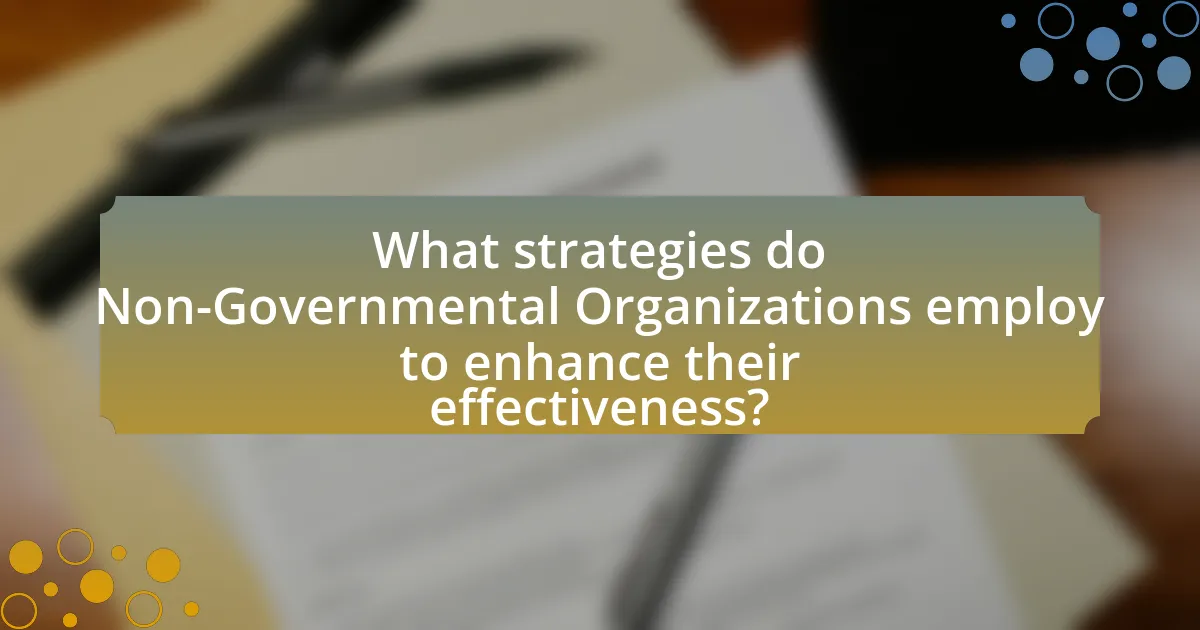
What strategies do Non-Governmental Organizations employ to enhance their effectiveness?
Non-Governmental Organizations (NGOs) enhance their effectiveness through strategic partnerships, advocacy, capacity building, and evidence-based research. Strategic partnerships with local communities and other organizations allow NGOs to leverage resources and expertise, thereby increasing their impact. Advocacy efforts focus on influencing policy changes and raising awareness about international criminal justice issues, which can lead to greater support and funding. Capacity building initiatives empower local stakeholders by providing training and resources, ensuring sustainable development and local ownership of projects. Evidence-based research supports their initiatives by providing data and insights that inform strategies and demonstrate the effectiveness of their interventions, as seen in studies highlighting the role of NGOs in promoting accountability in international criminal justice systems.
How do NGOs engage with local communities to promote justice?
NGOs engage with local communities to promote justice by facilitating dialogue, providing legal education, and advocating for policy changes. These organizations often conduct workshops and training sessions to empower community members with knowledge about their rights and the legal system, which enhances their ability to seek justice. For instance, NGOs like the International Justice Mission have successfully implemented community-based programs that educate individuals on legal processes, resulting in increased reporting of human rights abuses. Additionally, NGOs often collaborate with local leaders to identify justice-related issues and mobilize community action, thereby fostering a collective approach to addressing injustices. This engagement not only raises awareness but also builds trust between communities and justice systems, ultimately contributing to more equitable outcomes.
What methods do NGOs use to raise awareness and educate the public?
NGOs use various methods to raise awareness and educate the public, including campaigns, workshops, social media engagement, and partnerships with educational institutions. Campaigns often involve targeted messaging through advertisements and public events to inform communities about specific issues related to international criminal justice. Workshops provide interactive learning experiences, allowing participants to engage directly with the subject matter. Social media platforms serve as powerful tools for NGOs to disseminate information quickly and widely, reaching diverse audiences. Collaborations with educational institutions enhance outreach by integrating awareness programs into curricula, thereby fostering a deeper understanding of international criminal justice among students. These methods collectively contribute to increased public awareness and education on critical issues.
How do NGOs build partnerships with other stakeholders?
NGOs build partnerships with other stakeholders by engaging in collaborative initiatives, sharing resources, and fostering mutual goals. They often identify common interests with stakeholders such as governments, private sectors, and community organizations, which facilitates joint projects and advocacy efforts. For instance, NGOs may partner with local governments to implement community-based programs that address specific social issues, thereby leveraging each other’s strengths and expertise. This collaborative approach is supported by evidence showing that partnerships enhance resource mobilization and increase the effectiveness of interventions in international criminal justice, as seen in various case studies where NGOs successfully worked with law enforcement agencies to improve legal frameworks and promote accountability.
What role does advocacy play in the work of Non-Governmental Organizations?
Advocacy is central to the work of Non-Governmental Organizations (NGOs) as it drives awareness, influences policy, and mobilizes public support for issues related to international criminal justice. NGOs utilize advocacy to highlight injustices, promote accountability, and push for legal reforms, thereby shaping the discourse around human rights and justice. For instance, organizations like Human Rights Watch and Amnesty International have successfully lobbied for the establishment of international tribunals and the prosecution of war crimes, demonstrating the tangible impact of advocacy on global justice initiatives.
How do NGOs advocate for victims of international crimes?
NGOs advocate for victims of international crimes by providing legal assistance, raising awareness, and lobbying for policy changes. These organizations often work directly with victims to help them navigate legal systems, ensuring their voices are heard in international courts. For example, NGOs like Human Rights Watch and Amnesty International document human rights abuses and compile evidence to support victims’ claims, which can influence judicial proceedings. Additionally, they engage in public campaigns to educate the global community about the plight of victims, thereby fostering international pressure on governments to take action. This multifaceted approach not only empowers victims but also contributes to the broader pursuit of justice and accountability for international crimes.
What strategies do NGOs use to influence international policy?
NGOs influence international policy through advocacy, lobbying, and coalition-building. Advocacy involves raising awareness about specific issues, often using research and data to highlight the need for policy change. For instance, organizations like Human Rights Watch publish detailed reports that document human rights abuses, which can sway public opinion and prompt governmental action. Lobbying entails direct engagement with policymakers to persuade them to adopt certain positions or legislation, as seen when NGOs participate in United Nations meetings to push for resolutions on international justice. Coalition-building allows NGOs to unite various stakeholders, amplifying their voice and impact; for example, the Coalition for the International Criminal Court brings together over 2,500 NGOs to advocate for the ICC’s effectiveness and independence. These strategies collectively enhance the ability of NGOs to shape international policy effectively.
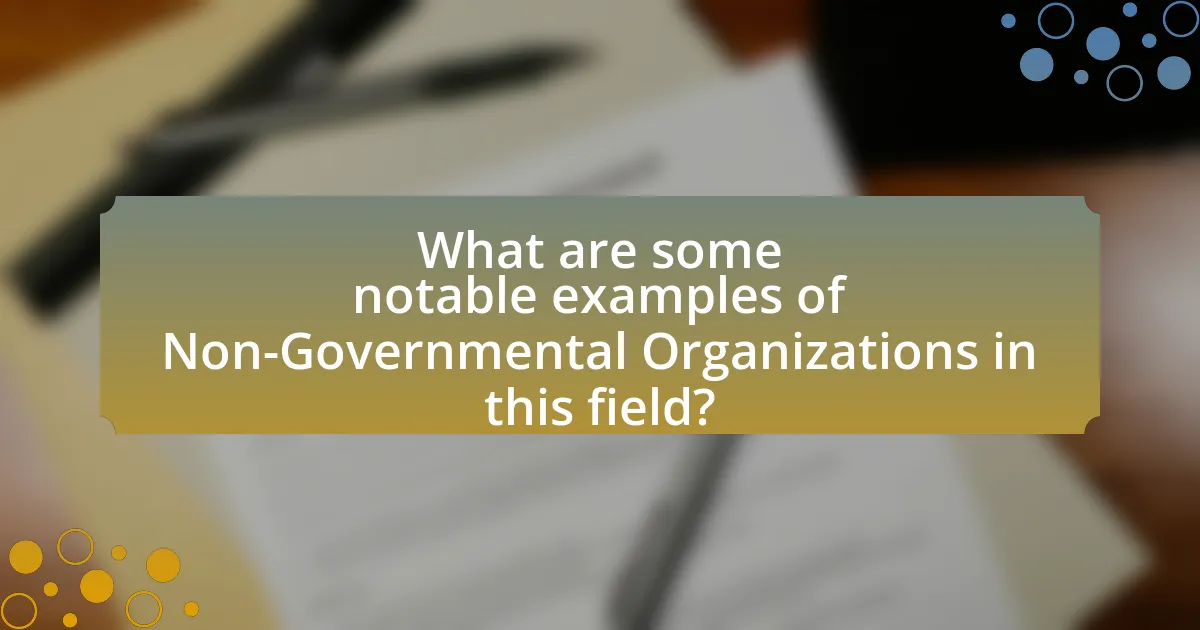
What are some notable examples of Non-Governmental Organizations in this field?
Notable examples of Non-Governmental Organizations (NGOs) in the field of promoting international criminal justice include Human Rights Watch, Amnesty International, and the International Federation for Human Rights. Human Rights Watch conducts rigorous investigations and advocacy to hold governments accountable for human rights abuses, while Amnesty International mobilizes public opinion to influence policy changes and promote justice globally. The International Federation for Human Rights works to protect human rights and promote justice through international advocacy and legal support. These organizations have been instrumental in raising awareness and influencing international legal frameworks, evidenced by their involvement in key human rights treaties and their contributions to the establishment of the International Criminal Court.
Which NGOs have made significant contributions to international criminal justice?
Several NGOs have made significant contributions to international criminal justice, including Human Rights Watch, Amnesty International, and the International Federation for Human Rights. Human Rights Watch has documented human rights abuses and advocated for accountability in war crimes, influencing international legal standards. Amnesty International has campaigned for the establishment of the International Criminal Court and has worked to ensure that justice is served for victims of atrocities. The International Federation for Human Rights has played a crucial role in promoting legal frameworks and supporting victims in seeking justice. These organizations have collectively advanced the cause of international criminal justice through advocacy, research, and legal support.
What specific initiatives have these organizations undertaken?
Non-governmental organizations (NGOs) have undertaken various specific initiatives to promote international criminal justice, including advocacy for the establishment of the International Criminal Court (ICC), monitoring war crimes, and providing legal assistance to victims. For instance, organizations like Human Rights Watch and Amnesty International have actively campaigned for accountability in war crimes through reports and lobbying efforts, influencing international policy and legal frameworks. Additionally, NGOs such as the Coalition for the International Criminal Court have worked to increase awareness and support for the ICC, resulting in greater global participation and funding for international justice initiatives. These efforts have led to significant legal advancements and increased scrutiny of human rights violations worldwide.
How have these initiatives impacted international criminal justice systems?
Initiatives by non-governmental organizations (NGOs) have significantly strengthened international criminal justice systems by enhancing accountability and promoting legal reforms. For instance, NGOs like Human Rights Watch and Amnesty International have documented human rights abuses, leading to increased pressure on governments and international bodies to take action. This documentation has resulted in the establishment of international tribunals, such as the International Criminal Court, which prosecutes war crimes and crimes against humanity. Furthermore, NGOs have played a crucial role in advocating for the adoption of international legal standards, influencing treaties and conventions that shape the framework of international law. Their efforts have also facilitated greater collaboration among states, leading to improved mechanisms for extradition and mutual legal assistance.
What lessons can be learned from the successes and failures of these NGOs?
Lessons learned from the successes and failures of NGOs in promoting international criminal justice include the importance of strategic partnerships, adaptability to changing political landscapes, and the necessity of evidence-based advocacy. Successful NGOs often collaborate with local communities and governments, enhancing their legitimacy and effectiveness, as seen in the work of Human Rights Watch in various conflict zones. Conversely, failures often stem from a lack of local engagement or understanding, leading to ineffective interventions, as illustrated by some initiatives that overlooked cultural contexts. Additionally, NGOs that adapt their strategies in response to political shifts, such as Amnesty International’s evolving focus on digital rights, demonstrate resilience and relevance in their missions. These lessons highlight the critical need for NGOs to remain responsive and grounded in local realities to achieve meaningful impact in international criminal justice.
What best practices have emerged from successful NGO interventions?
Successful NGO interventions have established best practices that include community engagement, evidence-based advocacy, and collaboration with local stakeholders. Community engagement ensures that interventions are culturally relevant and address the specific needs of the population, as seen in the work of organizations like Human Rights Watch, which emphasizes local input in their programs. Evidence-based advocacy involves using data and research to inform policy changes, demonstrated by the International Justice Resource Center, which utilizes legal analysis to support victims’ rights. Collaboration with local stakeholders enhances the effectiveness of interventions, as illustrated by the Coalition for the International Criminal Court, which partners with local NGOs to strengthen grassroots movements for justice. These practices have proven effective in promoting accountability and justice in various contexts.
How can NGOs improve their strategies based on past experiences?
NGOs can improve their strategies based on past experiences by conducting thorough evaluations of previous projects to identify successes and failures. This reflective practice allows organizations to adapt their approaches, ensuring that lessons learned inform future initiatives. For instance, a study by the International NGO Training and Research Centre highlights that NGOs that systematically analyze past interventions can enhance their effectiveness by 30% through targeted adjustments. By integrating feedback from stakeholders and beneficiaries, NGOs can refine their strategies to better address the needs of the communities they serve, ultimately leading to more impactful outcomes in promoting international criminal justice.
What practical steps can Non-Governmental Organizations take to enhance their impact?
Non-Governmental Organizations (NGOs) can enhance their impact by implementing strategic partnerships, increasing advocacy efforts, and utilizing data-driven approaches. Strategic partnerships with local communities, governments, and other organizations can amplify resources and reach, as evidenced by the collaboration between NGOs and the United Nations in various humanitarian efforts. Increasing advocacy efforts, such as raising awareness through campaigns and lobbying for policy changes, can lead to significant shifts in public opinion and legislative action, demonstrated by the success of NGOs in influencing international treaties. Utilizing data-driven approaches allows NGOs to measure their effectiveness and adapt their strategies based on evidence, which has been shown to improve program outcomes and accountability in various studies.
How can NGOs effectively mobilize resources and support?
NGOs can effectively mobilize resources and support by leveraging strategic partnerships, utilizing digital platforms for outreach, and engaging in targeted fundraising campaigns. Strategic partnerships with other organizations, governments, and private sectors enhance resource sharing and increase visibility. For instance, collaborations with local communities can lead to grassroots support and funding opportunities. Utilizing digital platforms, such as social media and crowdfunding websites, allows NGOs to reach a broader audience and engage potential donors effectively. According to a report by the Charities Aid Foundation, online fundraising has grown significantly, with 30% of donations made online in recent years. Targeted fundraising campaigns that align with specific projects or causes can also attract dedicated support, as evidenced by successful campaigns like the Ice Bucket Challenge, which raised over $115 million for ALS research.
What role does technology play in advancing NGO efforts in international criminal justice?
Technology plays a crucial role in advancing NGO efforts in international criminal justice by enhancing data collection, analysis, and dissemination. NGOs utilize digital tools to gather evidence of human rights violations, enabling them to document cases more efficiently and accurately. For instance, organizations like Human Rights Watch and Amnesty International employ satellite imagery and social media analysis to monitor conflicts and report on abuses in real-time. This technological integration not only improves the credibility of their reports but also facilitates collaboration with international legal bodies, thereby strengthening accountability mechanisms. Furthermore, technology enables NGOs to raise awareness and mobilize support through online campaigns, increasing public engagement and pressure on governments to act against impunity.
